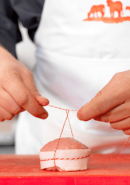I first heard of “Slow Food” during my stay in the small walled-in city of Lucca, Italy. While walking through an open square piazza, bosting some of the quaintest cafes, trattorias, and restaurants, I noticed a place advertising its fight for “Slow Food”. It seemed like a perfect place, so we sat down and over the next 4 hours I enjoyed my first true slow food dinner.
A fellow Chef and friend of mine who was dining with us that evening, explained to me the fundamentals of Slow food, and before my second glass of wine, I understood that slow food means a lot more then simply braising meats for many hours over low heat. I soon realized that Slow food is actually a blend of political awareness, social consciousness, and savory passion all created over the dinner table. I learned that in 1986, in a small town of Bra Italy, a man named Carlo Petrini founded an international, non-profit, eco-gastronomic organization, named Slow Food International. Interestingly enough, Slow food was actually born in direct response to the opening of a McDonald’s restaurant in Rome’s famous Piazza di Spagna.
One of our guests at the table stated “It seems as absurd as putting an abortion clinic in the Vatican.” Everyone seemed to nod to the graphic yet agreeable statement.
By this time the owner of the restaurant overheard our conversations and had come sit down with us. He poured himself a glass of house-made wine and offered his interpretation of Slow food and how he proudly positions his restaurant on the fundamentals of Slow Food. We continued to snack on spiced olives, young cheeses, platters of cured meats, pickled vegetables, smoked fish and crisp focaccia as the crowded table roared with gossip surrounding the popularity of Slow Food.
After starting our first plates of pasta, most everyone was now becoming boisterous with their emotional contribution to this focused and fast forward dinner conversation. One diner explained how slow food was created to counterbalance the high speed frenzy of chain store, fast food and fast life. It is to counteract the disappearance of local food and bring back the interest of tradition, value and sensibility to food.
The Slow Food philosophy states that the enjoyment of excellent food and drink should be combined with efforts to save the countless traditional grains, vegetables, fruits, animal breeds and food products that are disappearing due to the prevalence of convenience food and industrial agribusiness. (a Slow Food definition found on-line)
An American Student and Slow Food activist, who was dining with us that evening, recited an interesting statistic that fifty years ago, in the aftermath of World War II, the average family spent about one-third of its income on food. Today the average American spends about only 10 percent. And then further added her disgust of a world where tens of billions of dollars are spent each year on such nonessential items as gambling, cosmetic surgery and pornography, that there is clearly some wiggle room to spend a few dollars more a week on food.
After all shouldn’t we remember the infamous saying from a 19th century philosopher “We are what we eat.”
Its now 3 hours into the meal, and we are enjoying our meat course that just followed a scrumptious roasted fish dish. The heated conversation over dinner has made me reflect on my own lack of knowledge on this subject and my inadvertent support of the fast food culture.
Somehow, I don’t remember learning about much of this growing up. And somehow, I am sure many others at the table can admit to frequently feeding into the American Fast Food market. In confession style story, I admit to the table I am guilty of often driving through one of the many circus-surfaced burger joints, ordering a super sized, paper-packed meal substitute, just to continue driving onto the crowded freeway, burger in one hand steering wheel in another, complaining about slow moving traffic.
A simple look of disgust was quickly followed by a nod and admittance of guilt from many others at the table (Most I sadly have to mention were American)
With this I inadvertently turned the conversation onto ourselves and how many of us have force fed the fast food industry. With that I blurted out a few simple questions. Lets be honest, haven’t you ever cleaned out your car and found a petrified lonely French fry that managed to slip under your seat countless weeks ago, sitting lifeless next to a dirty quarter that was most likely dropped while trying to stuff away the received change from the drive in window? Have you ever come home after work and fished through your freezer to find a low cal, low fat, high energy meal sensation ready from your freezer to your microwave in 7 minutes? (Don’t most of us take more time then that to check our Blackberry)? How often do you eat at your desk while working throughout your lunch break, often polluting the air around your cubicle with the obnoxious odor of stale onions piled high on your overstuffed deli hero? How many times a week do you visit the local farmers market and buy sustainable grown organic ingredients to take home and prepare a fresh cooked meal. Or is it just easier to count the times you open your take out menu drawer and order number 5 from any random pamphlet?
Fast food is a way of life many of us are too familiar with. On any given trip the supermarket (more super then market), most consumers still fill there baskets with frozen dinners, boxed and bagged snacks, diet supplements, prepacked lunchables, and other ready to eat items. Only a small percent of the shopping cart seems to show fresh produce, meats and other fresh ingredients.
Now of course the native Italian friends looked at me with confusion and my American comrades now had a look of shame. But better to see the past and educate ourselves on making a better future I say.
After dessert was cleared, cordials of limoncello and sambuca accompanied our espressos and coffee and the table began to wind down and reflect on the beautiful meal we had all enjoyed over the course of 4 hours and laughed on some of the graphic, racy and sometimes naïve comments we made throughout the night And after slowly getting up with full bellies and slowly walking away, I realized that Slow Food became more than curious topic of conversation, it unmasked into a passion of preserving our culture of regional food traditions, and celebrating a slower more harmonious rhythm of life.




